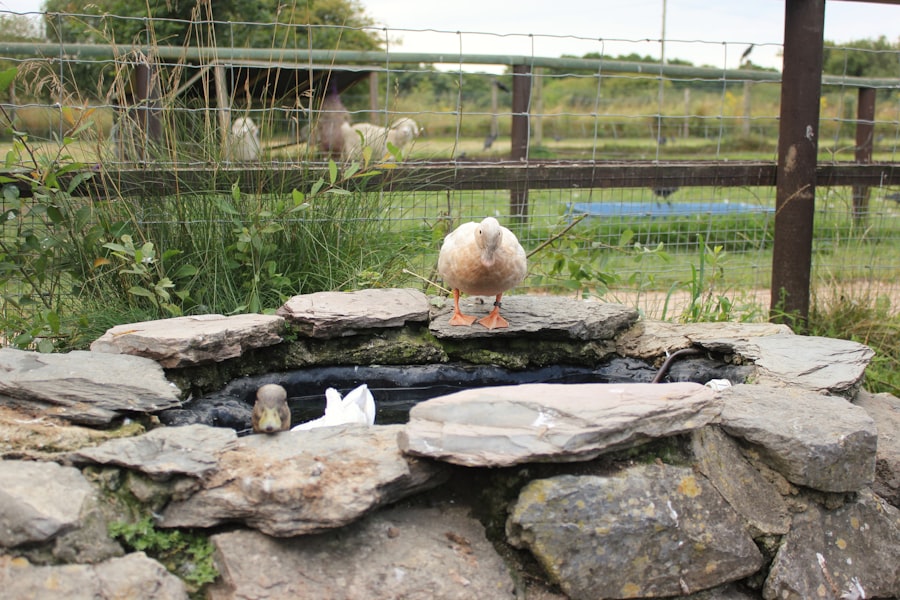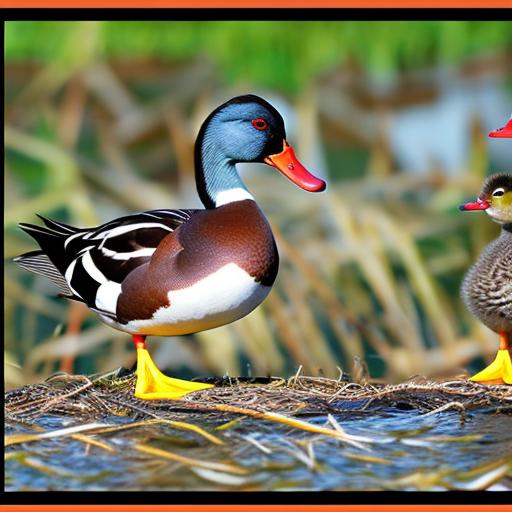Ducks have long been known for their ability to lay eggs, and in recent years, raising ducks for eggs has become increasingly popular. Duck eggs are larger and richer in nutrients compared to chicken eggs, making them a desirable choice for many people. Additionally, ducks are hardy birds that can adapt to various climates and environments, making them a practical choice for backyard egg production.
Key Takeaways
- There are many different breeds of ducks that are suitable for egg production.
- The best duck breeds for egg laying include the Khaki Campbell, Indian Runner, and Welsh Harlequin.
- Egg-laying ducks are typically smaller and lighter than meat ducks, and they lay more eggs.
- When choosing a duck breed for egg production, consider factors such as egg production rate, temperament, and climate adaptability.
- Raising ducks for eggs can provide a sustainable source of high-quality protein and other nutrients.
The Best Duck Breeds for Egg Laying
When it comes to choosing the best duck breeds for egg production, there are several options to consider. Here are the top five duck breeds known for their egg-laying abilities:
1. Khaki Campbell: The Khaki Campbell is a British breed that is highly regarded for its exceptional egg-laying capabilities. These ducks can lay up to 300 eggs per year, making them one of the most productive breeds. They are also known for their calm and friendly temperament.
2. Indian Runner: Indian Runner ducks are known for their distinctive upright posture and slender bodies. They are excellent layers, with the ability to produce around 200-300 eggs per year. Indian Runners come in various colors, including white, fawn, and black.
3. Welsh Harlequin: The Welsh Harlequin is a relatively new breed that was developed in Wales in the early 20th century. These ducks are known for their beautiful plumage and excellent egg-laying abilities. They can lay around 250-300 eggs per year.
4. Buff Orpington: While Buff Orpington ducks are primarily known for their meat production, they also lay a respectable number of eggs. These ducks have a calm and friendly temperament, making them a popular choice for backyard flocks.
5. Cayuga: Cayuga ducks are known for their striking black feathers with an iridescent green sheen. They are good layers, producing around 100-150 eggs per year. Cayugas are also known for their calm and docile nature.
Understanding the Characteristics of Egg-Laying Ducks
Several factors can affect egg production in ducks. Firstly, the breed plays a significant role in determining the number of eggs a duck can lay. Some breeds, like the Khaki Campbell and Indian Runner, are known for their high egg-laying capabilities, while others may produce fewer eggs.
Another factor that affects egg production is the age of the duck. Ducks typically start laying eggs at around six to seven months old and reach peak production at one to two years old. After that, egg production may decline gradually.
To identify a healthy egg-laying duck, there are a few key things to look for. A healthy duck should have bright and alert eyes, clean feathers, and a well-groomed appearance. Their feet should be clean and free from any sores or injuries. Additionally, a healthy duck will have a good appetite and show signs of energy and activity.
How to Choose the Right Duck Breed for Your Egg Production Needs
When choosing a duck breed for egg production, there are several factors to consider. Firstly, you need to assess your specific needs and environment. If you have limited space or live in an urban area, you may want to choose a smaller breed like the Indian Runner or Welsh Harlequin.
You should also consider the climate in your area. Some duck breeds are more cold-hardy than others and can tolerate colder temperatures. If you live in a colder region, breeds like the Cayuga or Buff Orpington may be more suitable.
It’s also important to consider your own preferences and requirements. Some people may prioritize high egg production, while others may prefer certain aesthetic qualities or temperament traits in their ducks.
The Benefits of Raising Ducks for Eggs
There are several benefits to raising ducks for eggs compared to other poultry options. Firstly, duck eggs are larger and richer in nutrients compared to chicken eggs. They have a higher fat content, which gives them a richer flavor and creamier texture. Duck eggs also have more protein, vitamins, and minerals.
In terms of environmental benefits, ducks are excellent foragers and can help control pests in your garden or backyard. They eat insects, slugs, and snails, reducing the need for chemical pesticides. Ducks also produce nutrient-rich manure that can be used as fertilizer for plants.
The Different Types of Duck Eggs and Their Nutritional Value

Duck eggs come in various types, with each having its own unique nutritional value. The most common type of duck egg is the Pekin duck egg, which is similar in size to a large chicken egg. Pekin duck eggs have a rich flavor and a slightly thicker shell compared to chicken eggs.
Muscovy duck eggs are another popular type of duck egg. Muscovy eggs are larger than Pekin eggs and have a higher fat content. They are known for their rich and creamy texture.
In terms of nutritional value, duck eggs are generally higher in protein, fat, and cholesterol compared to chicken eggs. They also contain more vitamins and minerals such as vitamin B12, vitamin A, iron, and selenium.
Breeding and Caring for Egg-Laying Ducks
Breeding ducks for egg production requires careful planning and management. To breed ducks, you will need a male (drake) and female (duck) of the same breed. It’s important to ensure that the ducks are mature enough for breeding, which is typically around six to seven months old.
To encourage breeding, provide a comfortable nesting area for the ducks with plenty of straw or other nesting materials. Ducks prefer privacy when laying eggs, so it’s important to create a secluded area where they can feel safe.
Once the eggs are laid, you can either let the ducks incubate them or use an incubator to hatch the eggs. Incubation typically takes around 28 days, and it’s important to maintain the right temperature and humidity levels throughout the process.
Tips for Maximizing Egg Production in Your Duck Flock
To maximize egg production in your duck flock, it’s important to create a comfortable and productive environment for your ducks. Provide a clean and spacious coop or shelter where the ducks can roost and lay their eggs. Make sure the coop is well-ventilated and protected from predators.
Feeding and watering are also crucial for egg production. Ducks should have access to fresh water at all times, as they need it for digestion and egg production. A balanced diet that includes a mix of commercial duck feed, grains, vegetables, and insects will help ensure optimal egg production.
Common Challenges in Raising Ducks for Eggs and How to Overcome Them
Raising ducks for eggs comes with its own set of challenges. Predators such as raccoons, foxes, and birds of prey can pose a threat to your ducks. It’s important to secure your coop or shelter with sturdy fencing and provide adequate protection against predators.
Diseases can also affect duck health and egg production. Regularly monitor your ducks for signs of illness, such as lethargy, loss of appetite, or abnormal droppings. Consult a veterinarian if you suspect any health issues.
Managing egg production during different seasons can also be challenging. Ducks may lay fewer eggs during colder months or when daylight hours are shorter. Providing supplemental lighting in the coop can help stimulate egg production during these times.
The Future of Duck Breeds for Egg Production: Trends and Innovations
The future of duck breeds for egg production is promising, with ongoing advancements in technology and breeding techniques. Breeders are continuously working to develop new strains of ducks that are more efficient in egg production and have desirable traits such as disease resistance and improved feed conversion.
Sustainable and ethical egg production practices are also gaining traction. More people are becoming conscious of the environmental impact of conventional egg production and are seeking alternatives. Raising ducks for eggs offers a more sustainable option, as ducks require less space and resources compared to chickens.
In conclusion, raising ducks for eggs is a rewarding endeavor that offers numerous benefits. With the right breed selection, proper care, and management, you can enjoy a steady supply of nutritious duck eggs while contributing to a more sustainable and ethical food system.
If you’re interested in learning more about breeds of ducks specifically for their egg-laying capabilities, you might find this article on Poultry Wizard quite informative. It discusses the different breeds of ducks that are known for their excellent egg production. From the popular Khaki Campbell to the adorable Indian Runner, each breed has its own unique qualities. To find out more about these fascinating ducks and which breed might be best for your needs, check out the article here.
FAQs
What are the best breeds of ducks for egg production?
Some of the best breeds of ducks for egg production include Khaki Campbell, Indian Runner, and Welsh Harlequin.
How many eggs can a duck lay in a year?
On average, a duck can lay between 150-200 eggs per year.
What is the size of eggs laid by ducks?
The size of eggs laid by ducks can vary depending on the breed, but they are generally smaller than chicken eggs.
What is the nutritional value of duck eggs?
Duck eggs are higher in protein and fat than chicken eggs, and also contain more vitamins and minerals such as vitamin B12, iron, and selenium.
Can ducks lay eggs year-round?
Most ducks will lay eggs during the spring and summer months, but some breeds such as Khaki Campbell can lay eggs year-round with proper care and nutrition.
How long does it take for a duck egg to hatch?
It takes approximately 28 days for a duck egg to hatch, although this can vary slightly depending on the breed and incubation conditions.
Can ducks be raised for both meat and eggs?
Yes, some breeds of ducks such as Pekin and Muscovy can be raised for both meat and eggs.
Meet Walter, the feathered-friend fanatic of Florida! Nestled in the sunshine state, Walter struts through life with his feathered companions, clucking his way to happiness. With a coop that’s fancier than a five-star hotel, he’s the Don Juan of the chicken world. When he’s not teaching his hens to do the cha-cha, you’ll find him in a heated debate with his prized rooster, Sir Clucks-a-Lot. Walter’s poultry passion is no yolk; he’s the sunny-side-up guy you never knew you needed in your flock of friends!







